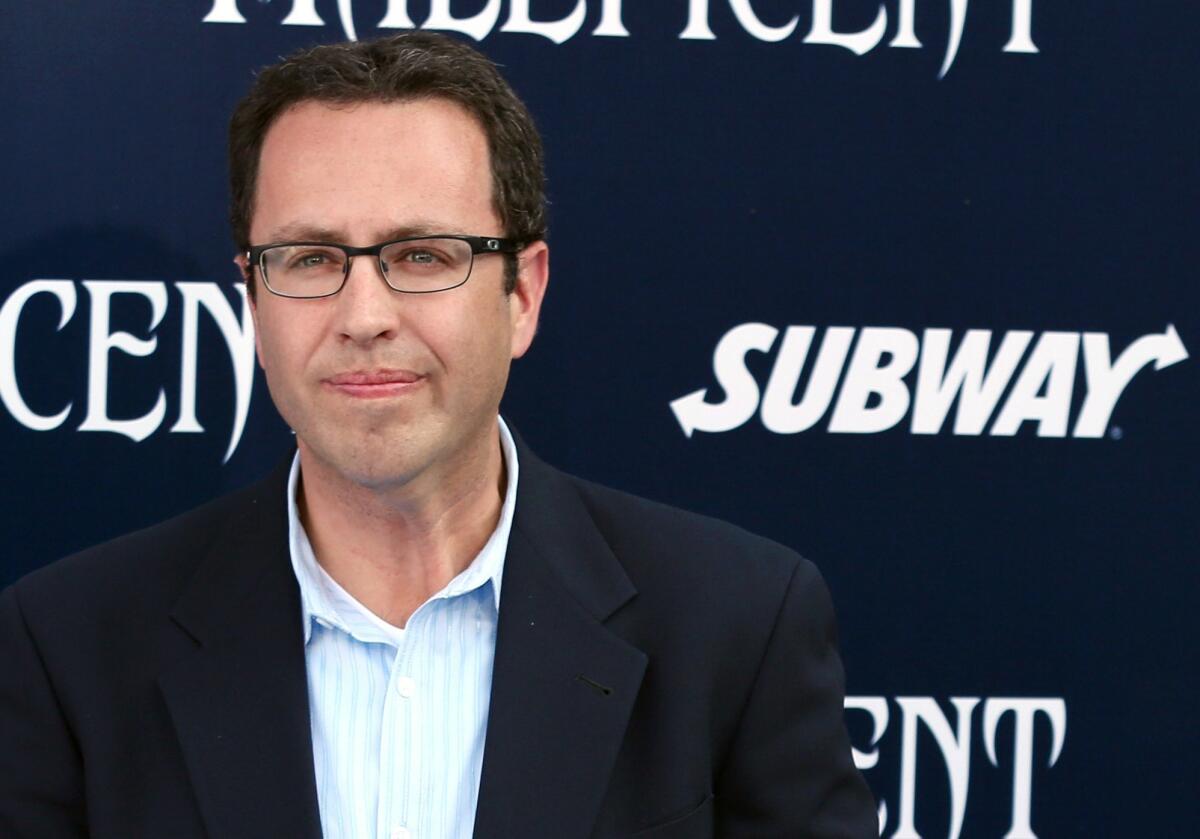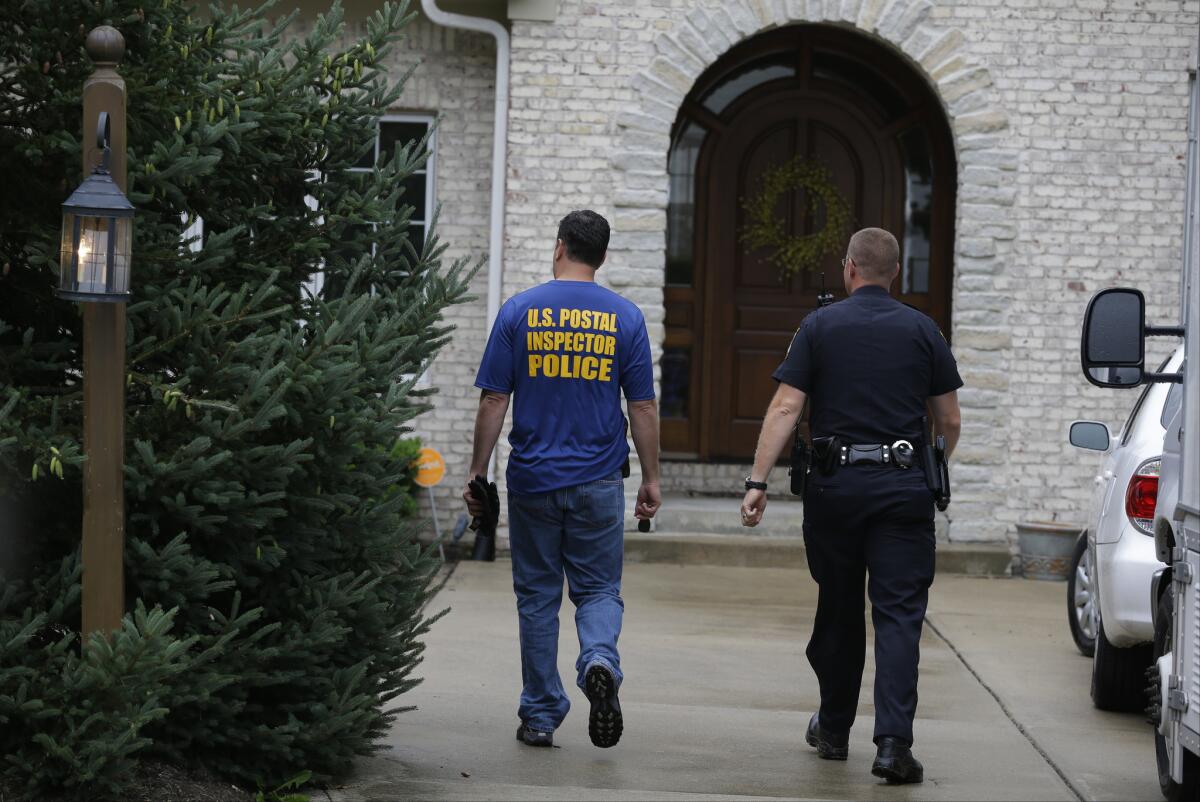The Subway guy: How Jared Fogle went from overweight student to cultural icon

Jared Fogle has been a spokesman for Subway since 2000. Above, he arrives at the world premiere of “Maleficent” in Los Angeles in 2014.
Before a federal investigation dragged his name through the mud Tuesday, Jared Fogle spent some 15 years as the face of Subway.
He helped it become one of the first fast-food chains to promote health and one of the most effective advertising brands in the restaurant industry, and he traveled the world and became a household name along the way.
Here's a look at Fogle's ups and downs as the Subway guy before his charges and eventual guilty plea:
He’d only intended to lose weight
In 1998, Fogle was a student at Indiana University, and he weighed 425 pounds.
Then 20 years old and unable to walk across campus, the official story goes, Fogle started eating two Subway sandwiches a day and exercising more. He chose the chain in part because it was nearby: "I lived 10 steps away from a Subway restaurant," he later told Men's Health.
Within 11 months, he'd dropped 245 pounds — more than half his body weight.
People noticed. A friend who'd lived in Fogle's dorm wrote a piece about him that landed on the front page of the student newspaper in April 1999, Fogle said in his memoir. Men's Health picked up the story, including it in the November 1999 article "Stupid Diets That Work."
Fogle catches Subway’s eye
Subway franchisees saw the Men's Health article and started writing to company headquarters about Fogle, according to the official story. So the company struck a deal with him, centering an ad campaign on his experience.
Fogle appeared in his first Subway commercial in 2000. Here's one of the early ones:
His everyday-Joe quality quickly gained mass appeal. By the next year, the sandwich company was showcasing success stories of others who had lost weight while eating its food.
Soon Fogle was making appearances around the country, standing up as grand marshal at a Subway-sponsored NASCAR race, carrying the 2002 Olympic torch through Indiana on its way to Salt Lake City and doing the coin toss at the 2003 Fiesta Bowl.
Pop culture comes calling
As the ad campaign became a fixture, TV shows and movies began to poke fun at it.
Jimmy Fallon played Fogle in a "Saturday Night Live" parody commercial in 2001.
The next year, "South Park" made Fogle the centerpiece of an episode.
"It was very flattering to see that they took a complete half hour talking about me," Fogle later told the Washington Post. "You know you've made it when shows like 'South Park' start parodying you."
He was also referenced in the 2002 movie "Austin Powers in Goldmember": The character Fat Bastard loses a massive amount of weight thanks to the "Subway diet."
Fogle has since appeared in "Super Size Me," a 2004 documentary about the health hazards of fast food, and on a slew of TV shows, including "Jimmy Kimmel Live."
Subway bets big on its Jared campaign
The sandwich company has spent the better part of two decades promoting Fogle, mixing him in dozens of commercials with famous people and with folks who similarly lost weight while eating Subway food.
He's brandished his "fat jeans," which have a 60-inch waistband and had fit him when he was at his heaviest, all over the world.
Fogle proved key to the chain’s marketing. According to AdAge, sales fell 10% after commercials featuring him briefly stopped airing in 2005.
Buoyed by the campaign's success, Subway sponsored a slew of health initiatives, including partnering with the American Heart Assn. and promoting Random Acts of Fitness for Kids.
Fogle started the Jared Foundation in 2004 to help fight childhood obesity in inner cities, and he published his book "Jared, the Subway Guy: Winning Through Losing" in 2006.
In 2008, Subway sent him on a huge "tour de pants" celebrating 10 years of keeping the weight off.
Through thick and thin
Fogle's job has involved some major bright spots, such as bringing his dad to watch his beloved Indianapolis Colts beat the Chicago Bears in the 2007 Super Bowl; hanging out with celebrated swimmer Michael Phelps, a fellow Subway pitchman; and meeting more than one U.S. president.
But by 2010, he'd regained 40 pounds.
Subway stuck with him, turning the setback into part of its marketing strategy. It focused on his getting back in shape, training to run the New York City Marathon. He ended up accomplishing the run in 5 hours, 13 minutes and 28 seconds and vowing, he told The Times in 2012, to "never do it again."
Fogle's efforts helped Subway become the restaurant industry's most effective advertising brand, a study by Technomic's Consumer Brand Metrics found in 2013.
"The length and authenticity of Jared's endorsement as a real person who, despite his struggles, has maintained a healthy lifestyle by eating Subway most likely resonates with consumers," AdAge quoted the study as saying.
Recent years brought more highs. For the 15-year anniversary of Fogle's weight loss, Subway aired a congratulatory commercial during the Super Bowl. Fogle visited the White House as part of a new Subway partnership with First Lady Michelle Obama. And the Muppets' Miss Piggy called herself the Subway guy's biggest fan.
Scandal hits
On Tuesday, Fogle's long run with Subway lurched to an at least temporary halt.
Fogle was caught in a whirlwind of suspicion after police and FBI agents paid an early-morning visit to his home in the Indianapolis suburbs and reportedly took documents and electronics away with them.

Federal authorities walk outside of the home of Subway restaurant spokesman Jared Fogle, Tuesday, July 7, 2015, in Zionsville, Ind. FBI agents and Indiana State Police have removed electronics from the property. (AP Photo/Michael Conroy)
Michael Conroy / Associated Press
Federal authorities would not confirm the investigation, but a former Jared Foundation executive was arrested in May on suspicion of making and possessing child pornography.
Subway proclaimed itself to be "shocked about the news" about its spokesman, and it set about removing his presence from the company website. Hours later, Subway announced that it and Fogle "have mutually agreed to suspend their relationship."
Fogle has been cooperating with the federal investigation, attorney Ron Elberger told the Indianapolis Star. "He has not been detained, arrested or charged with any crime or offense."
What will happen next? That depends, said Ira Kalb, assistant professor of clinical marketing at the USC Marshall School of Business.
"If something happens to his reputation, that is going to spill over to the brand," Kalb said. "The problem is that the people who are on these huge pedestals — when they have a fall, they come crashing down."
ALSO:
ESPN dumps Donald Trump, pulls golf tournament from his course
Bill Cosby's admission on Quaaludes may spur lawsuits against him
'Satan is subtle,' same-sex marriage foes warn as they prepare to fight court ruling
Inside the business of entertainment
The Wide Shot brings you news, analysis and insights on everything from streaming wars to production — and what it all means for the future.
You may occasionally receive promotional content from the Los Angeles Times.








